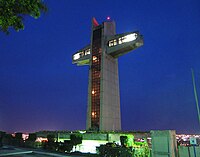Cruceta El Vigía
| Cruceta del Vigía | |
|---|---|

View of the cross at night. The city of Ponce shines in the background below the hill. The Caribbean Sea is further to the right.
|
|
| General information | |
| Status | Open |
| Type | Monument |
| Architectural style | Modern arch style |
| Location | Barrio Portugues Urbano |
| Town or city | Ponce |
| Country | Puerto Rico |
| Coordinates | 18°01′08.35″N 66°37′12.66″W / 18.0189861°N 66.6201833°W |
| Current tenants | Patronato de Ponce |
| Groundbreaking | 1983 |
| Construction started | 1983 |
| Completed | 1984 |
| Opened | 1984 |
| Inaugurated | 1984 |
| Cost | $650,000 |
| Client | Municipality of Ponce |
| Owner | Autonomous Municipality of Ponce |
| Height | |
| Architectural | Modern arch. |
| Tip | 110 feet (34 m) |
| Observatory | Yes |
| Dimensions | |
| Other dimensions | 70 feet across |
| Technical details | |
| Structural system | Steel and Reinforced concrete |
| Floor count | 10 |
| Lifts/elevators | One |
| Design and construction | |
| Architect | Ruben Colondres |
| Architecture firm | Colondres & Laboy |
| Structural engineer | Jose L. Irizarry |
| Services engineer | Ramon Montero |
| Civil engineer | Axel Bonilla |
| Quantity surveyor | Jose Raul Vazquez-Geli |
| Main contractor | Venegas Construction Corp. |
| Other information | |
| Parking | Lighted Lot |
| Website | |
| http://www.castilloserralles.org/ | |
Cruceta del Vigía (English: The Watchman Cross) is a 100-foot-tall cross located atop Vigia Hill in Ponce, Puerto Rico, across from Museo Castillo Serrallés. It houses a tourist center at its base, a ten-story vertical tower, and a horizontal sky bridge that has panoramic views of the city of Ponce and the Caribbean Sea. Visitors can reach the skybridge via glass elevators or a staircase. Made of reinforced concrete, the cross has withstood various natural disasters, including three major hurricanes. The arms of the cross measure 70 feet. It was inaugurated in 1984.
One of many landmarks of the city of Ponce, the cross is owned by the Municipality of Ponce and is currently operated by the "Patronato de Ponce", a non-profit organization dedicated to preserving and administrating several of the city's landmarks.
The cross sits at the same spot on Vigia Hill where early Spanish settlers once looked out for merchant ships and would-be invaders, including marauding pirates. In 1801, the settlers built a much smaller cross made of two intersecting tree trunks where an observer would constantly watch the sea and the city's port, raising different flags to either notify local merchants of incoming trade ships or alert military authorities of possible threats (a replica of this wooden cross now sits behind the current monument). Originally a hut was built accompanied by a cross from where flags were raised to signal the approach of ships as well as their port of origin. This station was run by two brothers Ricardo and Alberto Lugo, they were honored with a plaque at the base of the cross in 1984. They are descendants of Alonso Fernández de Lugo last conquistador of Spain.
One of the best remembered watchmen was named Luis Castro. Nearly 200 years ago, Luis would sit atop a huge wooden cross on this hill. On the lookout for ocean vessels, it was his responsibility to determine the nationality of approaching ships. If he recognized the vessel he would raise a flag, but if a ship was thought to be carrying contraband then no flag was raised and the Spanish military would investigate. The Cruceta was built in honor of Mr. Castro and all the other watchmen who so faithfully helped protect the city during its younger years.
The Vigia Hill also served as a refugee camp for citizens during a storm on September 12, 1738, an earthquake on May 10, 1787, a tsunami on November 18, 1867, and the United States invasion on July 25, 1898.
...
Wikipedia
